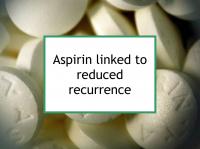Use of aspirin (acetyl salicylic acid), a nonsteroidal anti-inflammatory drug (NSAID), has been studied extensively with somewhat inconsistent results. Based on evidence to date, aspirin does not appear to prevent breast cancer, but use after diagnosis might reduce breast cancer-specific mortality. Now a new study has reported that long-term low-dose aspirin use is associated with reduced risk of breast cancer recurrence.
Aspirin and breast cancer
Aspirin inhibits breast cancer in part by reducing inflammation and inhibiting COX-2 overexpression. NSAIDs such as aspirin act by blocking the production of prostaglandins, of which COX-2 is one. Aspirin also can reduce circulating sex steroid hormone levels that are associated with increased ER+ breast cancer risk. One study reported that frequency of aspirin use was inversely associated with concentrations of estradiol, free estradiol, the ratio of estradiol to testosterone, and estrone sulfate. Aspirin has also been reported to inhibit aromatase activity (in which androgens are converted to estrogens in the body).
In another study, aspirin was found to significantly reduce the self-renewal capacity and growth of breast cancer stem cells. The same study reported that aspirin delayed the formation of palpable tumors in mice bearing tumor grafts, and also inhibited the growth of any tumors that did form.
Aspirin has potentially serious side effects
Note that regular aspirin use can have potentially serious side effects, including gastrointestinal bleeding, anemia, hemorrhagic stroke, and age-related macular degeneration.
Latest research finds lower recurrence in long-term aspirin users
The large Danish study referenced above was designed to investigate the association between low-dose aspirin use and breast cancer recurrence and mortality in long-term survivors. To conduct the study, the authors used the Danish Breast Cancer Group clinical database to identify 20,509 women at least 40 years old diagnosed with stage I-III breast cancer during the period 1996 to 2004. The database was also used to identify recurrences. The Danish Prescription Registry provided information concerning aspirin use. Analyses were made at five, 10, and 15 years after diagnosis. Results were adjusted for a variety of potentially confounding factors. Use of aspirin before breast cancer diagnosis was not covered by the study.
Breast cancer recurrence occurred in 4,527 (22.1%) of study participants over the study period. Low-dose aspirin users had a 20-year cumulative incidence of recurrence of 17.8% compared to 22.4% for nonusers. Similar trends were observed for 10-year disease-free survivors (9.9% vs. 12.7%). The adjusted risk of recurrence was lower in low-dose aspirin users compared to nonusers at each of the five-year analyses. However, the risk of all-cause mortality was slightly higher in low-dose aspirin users, a finding that may be due in part to the fact that these survivors had more coexisting medical conditions and used more medications than nonusers.
The authors conclude that the finding of reduced recurrence in low-dose aspirin users may indicate potential anti-cancer effects of aspirin. The increased risk of death among aspirin users suggests influence by confounding by indication (since use of aspirin typically is prescribed for heart disease, which would be expected to increase mortality) and competing risks.
Please see our article on aspirin and breast cancer and the aspirin tag for more information.
